2024届高三英语二轮复习:词类 句子成分课件(共36张PPT)
文档属性
| 名称 | 2024届高三英语二轮复习:词类 句子成分课件(共36张PPT) | 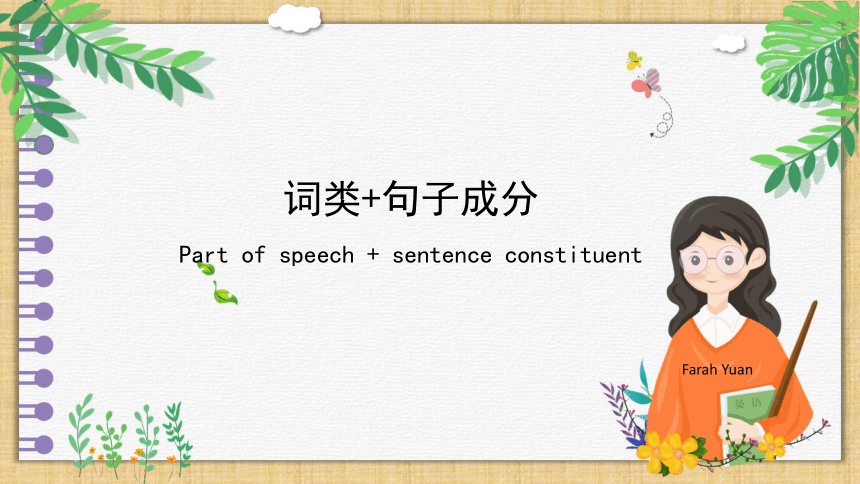 | |
| 格式 | pptx | ||
| 文件大小 | 6.8MB | ||
| 资源类型 | 教案 | ||
| 版本资源 | 通用版 | ||
| 科目 | 英语 | ||
| 更新时间 | 2023-07-19 15:18:08 | ||
图片预览

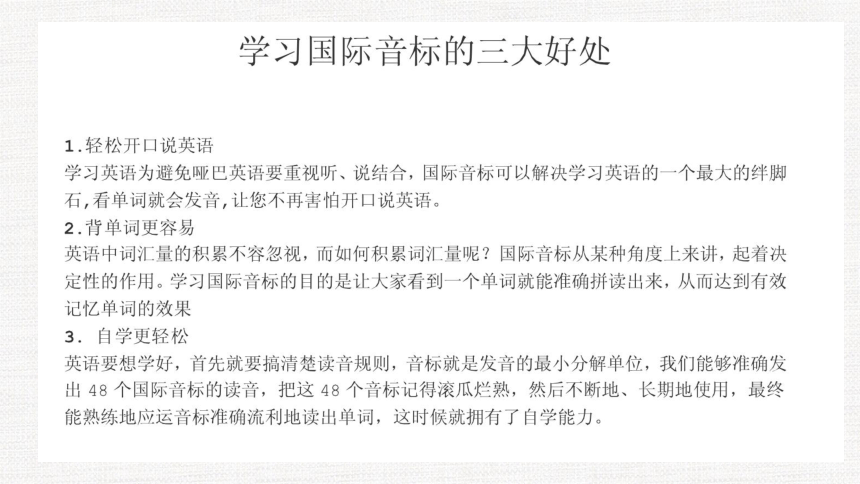


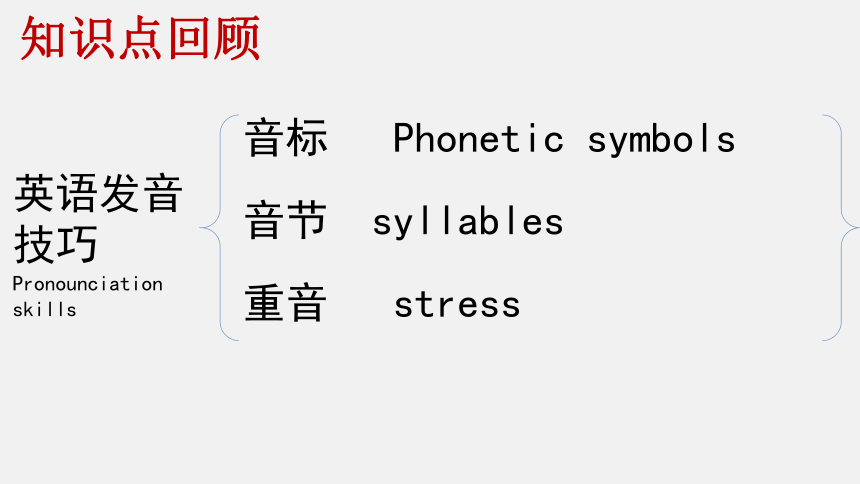
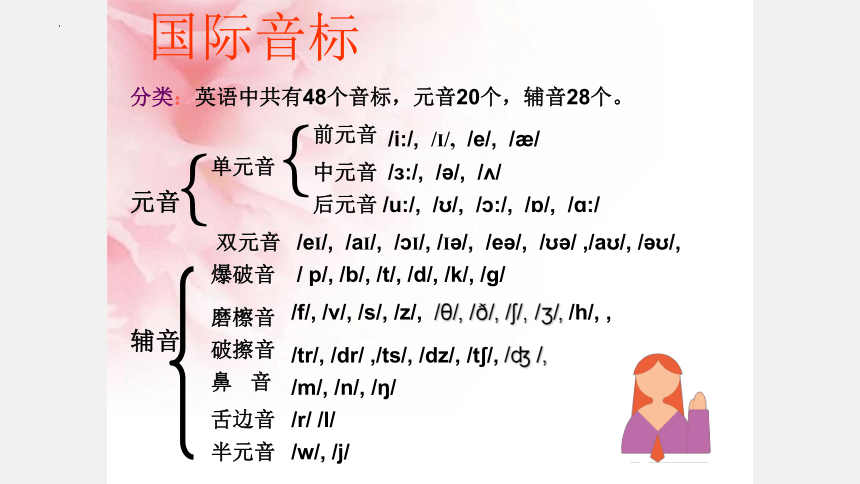
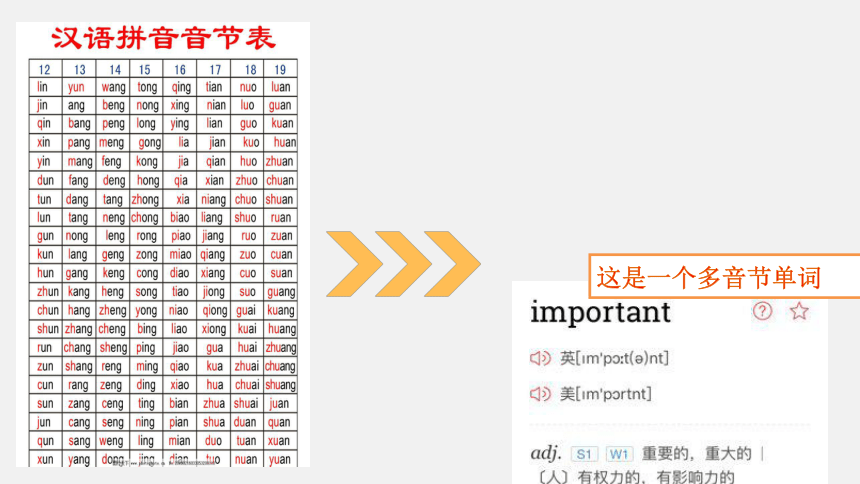

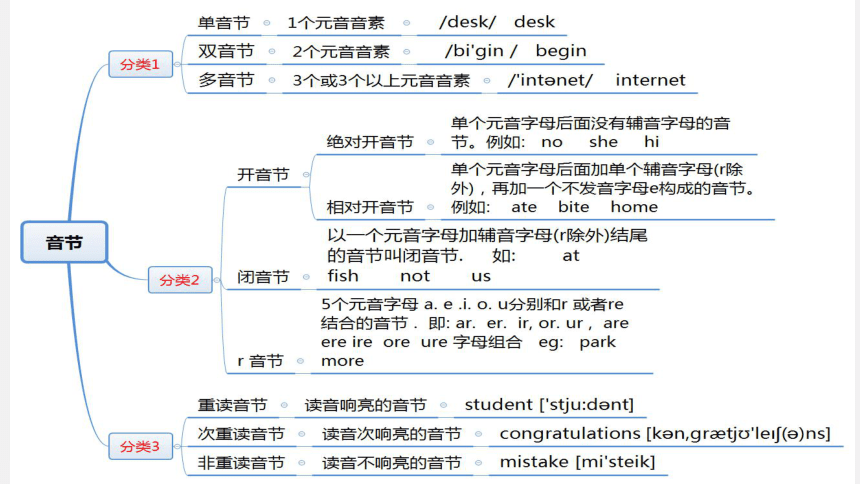
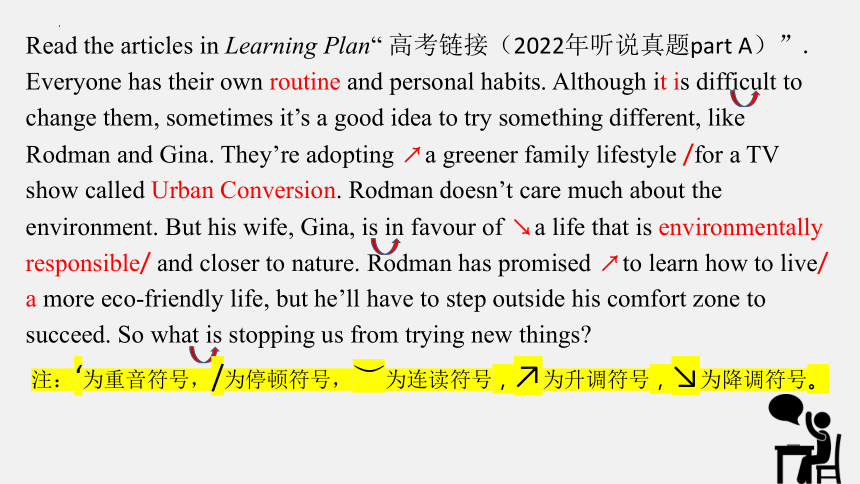


文档简介
(共36张PPT)
词类+句子成分
Part of speech + sentence constituent
Farah Yuan
广东高考英语听说考试Part 1 评分要求:Clear and accurate pronunciation
广东高考英语听说考试Part 3 评分要求:
Pronunciation and intonation do not affect comprehension
音标 Phonetic symbols
音节 syllables
重音 stress
英语发音技巧Pronounciation skills
知识点回顾
国际音标
{
元音
分类:英语中共有48个音标,元音20个,辅音28个。
单元音
双元音
前元音
中元音
后元音
{
/i:/, /I/, /e/, / /
/ :/, / /, / /
/u:/, / /, / :/, / /, /ɑ:/
/eI/, /aI/, / I/, /I /, /e /, / / ,/a /, / /,
辅音
爆破音
磨檫音
鼻 音
半元音
舌边音
/ p/, /b/, /t/, /d/, /k/, /g/
/f/, /v/, /s/, /z/, /θ/, / /, / /, / /, /h/, ,
/m/, /n/, / /
/r/ /l/
/w/, /j/
/tr/, /dr/ ,/ts/, /dz/, /t /, / /,
破擦音
这是一个多音节单词
音
节syllable
开音节
闭音节:
绝对开音节:
相对开音节:
以单个元音字母+辅音字母(r 除外)+不发音字母e”结尾.
如:make, fine, bike, hate
元音字母和字母r的各种组合 。
如:ar , er , ir ,or, ur, are, ere, ire, ore, ure , ear, eer, oor 等
(元+辅 闭)
r 音节:
以 单个元音字母+辅音字母(r 除外)结尾
如: cat, egg, swim
(元+尾 开)
以单个元音字母结尾。如:she, go, hi , my
(元+辅+e开)
Take notes!
Read the articles in Learning Plan“ 高考链接(2022年听说真题part A)”. Everyone has their own routine and personal habits. Although it is difficult to change them, sometimes it’s a good idea to try something different, like Rodman and Gina. They’re adopting ↗a greener family lifestyle /for a TV show called Urban Conversion. Rodman doesn’t care much about the environment. But his wife, Gina, is in favour of ↘a life that is environmentally responsible/ and closer to nature. Rodman has promised ↗to learn how to live/ a more eco-friendly life, but he’ll have to step outside his comfort zone to succeed. So what is stopping us from trying new things
注:‘为重音符号,/为停顿符号,︶为连读符号,↗为升调符号,↘为降调符号。
词类 &
句子成分(一)
一、词类(10种)
名词
形容词
代词
数词
冠词
动词
副词
介词
连词
感叹词
noun
adjectives
pronouns
numerals
articles
The verb
adverbs
prepositions
conjunctions
interjections
词类 作 用usage 例 词example words
1. (n.)名 词 表示人或事物的名称。The name of a person or thing I bought a book .
She is a student.
2. (pron.)代词 代替名词、数词等。Take the place of a noun, number, etc This is my friend.
He likes that book because it is very useful to him.
Parts of Speach
代词pron.
我 你 他/她/它 我们 你们 你们
主格 I you he/she/it we you they
宾格 me you him/her/it us you them
形容词物代 my your his/her/its our your their
名词物代 mine yours his/hers/its ours yours theirs
反身代词 myself yourself himself/herself/itself ourselves yourselves themselves
nominative
accusative
Adjective possessive
pronoun
Noun possessive pronoun
Reflexive
pronouns
当堂练习(practice)
1. Do you know that woman Why are you looking at _________
2. I don’t like dogs. I’m afraid of _________.
3. My brother has a new job, but ______ doesn’t like _____ very much.
4. This is a beautiful tree. _______ leaves are a beautiful color.
5. Five years later, I found __________( I ) working in the office
of a movie company.
her
them
he
it
Its
myself
3. (adj.) 形容词 表示人或事物的特征或性状。A characteristic or trait of a person or thing He is small but he is clever.
The red pen is useful for the teacher.
He painted the wall white yesterday.
4. (num.)数词 表示数目或顺序。 Indicates a number or order. There are ten apples on the table and I will take the first one.
5. (v.)动 词 表示动作或状态。Denotes an action or state. We are working hard at English.
I want to become an engineer.
6. (adv.)副 词 表示动作的特征或性状特征。 A characteristic or trait of an action I like English very much.
The teacher treats us kindly .
The train goes fast.
He seldom comes to see us.
7. (prep.)介 词 表示名词、代词和其他词之间的关系。Shows the relationship between nouns, pronouns, and other words He usually stay at home on Sundays.
8. (conj.)连词 连接词与词或句与句的作用。Connect with words or sentences with sentences He and I are in the same class and we are good friends.
Two or three of us can dance well but I can’t .
9. (interj.)感叹词 表示强烈的感情 Show strong feelings Oh ! How beautiful the scene is!
What a good idea! Goodness !
10. (art.)冠词 用来限制名词的意义。Used to limit the meaning of a noun. I have a pet dog .
The dog is very lovely.
He is an old man but very strong.
名词:表示人、事物、地点或抽象概念的名称。
boy, morning, bag, ball, class, orange,Tom,beauty…
代词:主要用来代替名词 who, she, you, it …
形容词:表示人或事物的性质或特征. good, right,tall.easy…
数词: 表示数目或事物的one, two, first…
动词:表示动作或状态、性质.am, is, are, have,see,come …
副词:修饰动词、形容词或其他副词,说明时间、地点、程度等 now, very, here, often, quietly, slowly,frankly…
冠词:用在名词前,帮助说明名词 a, an, the
介词: 表示它后面的名词或代词与其他句子成分的关系。in, on, from, above, behind…
连词:用来连接词、短语或句子and, but, before…
感叹词:表示喜、怒、哀、乐等感情oh, well, hi, hello...
知识回顾
课堂练习
(一)填空或填写括号内单词的正确形式
1. To break the silence, the teacher told______joke and the students all laughed right away.
2. They often meet and share their _____________(think), feelings and experiences.
3. Wearing red can help you make a decision more ___________ (quick).
4. Mary was very sad at the news, so she looked sadly at her husband, her eyes full _____sadness.
5. The boy didn’t pass the entrance examination, _______ his parents were unhappy about the result.
6. There, my voice sounds really ___________(wonder) because there’s a slight echo(回音)to it.
7. Researchers have found, in _______(they)experiment, that
a baby’s cries can cause special responses(反应) in the brain.
a
thoughts
so
wonderful
their
of
quickly
句子成分 (一)
sentence constituent
取得英语语法成功的基石
The cornerstone of success in English grammar
句子
句子是由词按照一定的语法结构组成的, 是表达一个完整概念的语言单位。
Sentence is composed of words according to a certain grammatical structure, which is a linguistic unit expressing a complete concept.
句子开头的第一个字母要大写;结尾要有句号“.”、问号“ ”或感叹号“﹗”。
The first letter at the beginning of a sentence should be capitalized with a period at the end. , a question mark " " ,or the exclamation mark "!" .
Tom likes rock music.
What are you doing now
How beautiful it is!
什么叫句子成分呢?句子的组成成分叫句子成分。
现代汉语里一般的句子成分有六种,即主语、谓语、宾语、定语、状语和补语。
英语的基本成分有七种:主语(subject)、谓语(predicate)、表语(predicative)、宾语(object)、定语(attribute)、状语(adverbial) 和补语(complement)。
二、句子成分
主语: 谁(名词或代词)I’m Miss Green.
谓语: 做什么(动词)He cleans the room.
表语: 怎么样(名词、代词或形容词)
My name is Ping ping
宾语: 什么(名词或代词)
He can spell the word
定语: 修饰名词或代词 a big city
状语: 修饰动词、形容词、副词(副词)
. works hard
宾补: 说明宾语怎么样或干什么(形容词或动词)
keep their classroom clean
☆同位语(appositive): 紧跟在名词代词后面,进一步说明
Where is your classmate, Tom
一、主语
主语(subject):句子说明的人或事物。主语一般位于______ 。The person or thing described by the sentence. The subject is usually located at the .
1.Lucy likes her new bike.
2.We work hard.
3.To learn a foreign language is not easy.
4.Playing football after school is great fun.
句首
句子成分 主语
beginning of the sentence
二、谓语(predicate)
谓语:说明主语做什么或怎么样。通常由______ 充当.
动词常分为
实义动词(Content verbs),连系动词(linking verbs),情态动词(modal verbs)和助动词 ( auxiliary verbs).
动词
实义动词(Content verbs)
及物动词(Transitive verb )
vt: 可以直接带宾语:like,finish等
eg:We learn English every day.
不及物动词(intransitive verb
vi:不能直接带宾语:run, smile,listen,look等
e.g.: Horses run fast。
He sings well.
△情态动词和助动词不能单独充当谓语,必须和实义动词或系动词一起构成谓语.Modal verbs and auxiliary verbs cannot act as predicates alone, but must form predicates together with the content or connection verbs.
情态动词:表语气和态度,can, should,
may, shall ,must 等
助动词: 帮助构成时态、语态
如 do(does,did), will(won’t), be等
e.g.
They can speak English well.
They are playing over there.
1)状态系动词(be动词),用来表示主语状态,只有be一词
He is a teacher.
2)持续系动词,用来表示主语继续或保持一种状况或态度,主要有keep, remain, stay
He always kept silent at meeting.
3)变化系动词,表示主语变成什么样,主要有become, grow, turn, fall, get, go, come
He became mad after that.
4)表像系动词,用来表示"看起来像"这一概念,主要有seem, appear,
He seems (to be) very sad.
5)感官系动词,主要有feel, smell, sound, taste,look
This flower smells very sweet.
系动词分类(Classification of link verbs)
课堂练习:请找出下列句子谓语并判断其动词类型。
1. We love China. ( )
2. We have finished reading this book.( )
3. He can speak English. ( )
4. She seems tired. ( )
5. I don't like the picture on the wall. ( )
6. The days get longer and longer when summer comes. ( )
实义动词
助动词+ 实义动词
情态动词+实义动词
系动词
助动词+实义动词
系动词
课后练习
填空或填写括号内单词的正确形式
1. “But such a small thing couldn’t __________(possible) destroy a village.” (2013广东)
2. He’s very excited_________the possiblity of playing for England’s first team.
3.The little girl is very kind _____she always talks to people politely.
4.The boy is creative, and he has ______________(success) invented some useful tools.
5. She once led a ____________ (home) child to her home and made the child her younger sister.
6. I cannot control my body well. My legs become __________ (pain).
7. Peter bought a new house by the seaside last year. His family go to________ house twice a week for holiday.
possibly
about
successfully
and
homeless
painful
the
课后练习(句子成分)
1. There will be a meeting at the library this afternoon.( )
2. Did the twins have porridge for their breakfast ( )
3. Tom didn't do his homework yesterday.( )
4. We had better send for a doctor.( )
5. He is interested in music.( )
6. Whom did you give my book to ( )
请找出下列句子谓语并判断其动词类型
助动词+系动词
助动词+实义动词
助动词+实义动词
助动词+实义动词
系动词
助动词+实义动词
句子成分
---From Farah
Thank you!
词类+句子成分
Part of speech + sentence constituent
Farah Yuan
广东高考英语听说考试Part 1 评分要求:Clear and accurate pronunciation
广东高考英语听说考试Part 3 评分要求:
Pronunciation and intonation do not affect comprehension
音标 Phonetic symbols
音节 syllables
重音 stress
英语发音技巧Pronounciation skills
知识点回顾
国际音标
{
元音
分类:英语中共有48个音标,元音20个,辅音28个。
单元音
双元音
前元音
中元音
后元音
{
/i:/, /I/, /e/, / /
/ :/, / /, / /
/u:/, / /, / :/, / /, /ɑ:/
/eI/, /aI/, / I/, /I /, /e /, / / ,/a /, / /,
辅音
爆破音
磨檫音
鼻 音
半元音
舌边音
/ p/, /b/, /t/, /d/, /k/, /g/
/f/, /v/, /s/, /z/, /θ/, / /, / /, / /, /h/, ,
/m/, /n/, / /
/r/ /l/
/w/, /j/
/tr/, /dr/ ,/ts/, /dz/, /t /, / /,
破擦音
这是一个多音节单词
音
节syllable
开音节
闭音节:
绝对开音节:
相对开音节:
以单个元音字母+辅音字母(r 除外)+不发音字母e”结尾.
如:make, fine, bike, hate
元音字母和字母r的各种组合 。
如:ar , er , ir ,or, ur, are, ere, ire, ore, ure , ear, eer, oor 等
(元+辅 闭)
r 音节:
以 单个元音字母+辅音字母(r 除外)结尾
如: cat, egg, swim
(元+尾 开)
以单个元音字母结尾。如:she, go, hi , my
(元+辅+e开)
Take notes!
Read the articles in Learning Plan“ 高考链接(2022年听说真题part A)”. Everyone has their own routine and personal habits. Although it is difficult to change them, sometimes it’s a good idea to try something different, like Rodman and Gina. They’re adopting ↗a greener family lifestyle /for a TV show called Urban Conversion. Rodman doesn’t care much about the environment. But his wife, Gina, is in favour of ↘a life that is environmentally responsible/ and closer to nature. Rodman has promised ↗to learn how to live/ a more eco-friendly life, but he’ll have to step outside his comfort zone to succeed. So what is stopping us from trying new things
注:‘为重音符号,/为停顿符号,︶为连读符号,↗为升调符号,↘为降调符号。
词类 &
句子成分(一)
一、词类(10种)
名词
形容词
代词
数词
冠词
动词
副词
介词
连词
感叹词
noun
adjectives
pronouns
numerals
articles
The verb
adverbs
prepositions
conjunctions
interjections
词类 作 用usage 例 词example words
1. (n.)名 词 表示人或事物的名称。The name of a person or thing I bought a book .
She is a student.
2. (pron.)代词 代替名词、数词等。Take the place of a noun, number, etc This is my friend.
He likes that book because it is very useful to him.
Parts of Speach
代词pron.
我 你 他/她/它 我们 你们 你们
主格 I you he/she/it we you they
宾格 me you him/her/it us you them
形容词物代 my your his/her/its our your their
名词物代 mine yours his/hers/its ours yours theirs
反身代词 myself yourself himself/herself/itself ourselves yourselves themselves
nominative
accusative
Adjective possessive
pronoun
Noun possessive pronoun
Reflexive
pronouns
当堂练习(practice)
1. Do you know that woman Why are you looking at _________
2. I don’t like dogs. I’m afraid of _________.
3. My brother has a new job, but ______ doesn’t like _____ very much.
4. This is a beautiful tree. _______ leaves are a beautiful color.
5. Five years later, I found __________( I ) working in the office
of a movie company.
her
them
he
it
Its
myself
3. (adj.) 形容词 表示人或事物的特征或性状。A characteristic or trait of a person or thing He is small but he is clever.
The red pen is useful for the teacher.
He painted the wall white yesterday.
4. (num.)数词 表示数目或顺序。 Indicates a number or order. There are ten apples on the table and I will take the first one.
5. (v.)动 词 表示动作或状态。Denotes an action or state. We are working hard at English.
I want to become an engineer.
6. (adv.)副 词 表示动作的特征或性状特征。 A characteristic or trait of an action I like English very much.
The teacher treats us kindly .
The train goes fast.
He seldom comes to see us.
7. (prep.)介 词 表示名词、代词和其他词之间的关系。Shows the relationship between nouns, pronouns, and other words He usually stay at home on Sundays.
8. (conj.)连词 连接词与词或句与句的作用。Connect with words or sentences with sentences He and I are in the same class and we are good friends.
Two or three of us can dance well but I can’t .
9. (interj.)感叹词 表示强烈的感情 Show strong feelings Oh ! How beautiful the scene is!
What a good idea! Goodness !
10. (art.)冠词 用来限制名词的意义。Used to limit the meaning of a noun. I have a pet dog .
The dog is very lovely.
He is an old man but very strong.
名词:表示人、事物、地点或抽象概念的名称。
boy, morning, bag, ball, class, orange,Tom,beauty…
代词:主要用来代替名词 who, she, you, it …
形容词:表示人或事物的性质或特征. good, right,tall.easy…
数词: 表示数目或事物的one, two, first…
动词:表示动作或状态、性质.am, is, are, have,see,come …
副词:修饰动词、形容词或其他副词,说明时间、地点、程度等 now, very, here, often, quietly, slowly,frankly…
冠词:用在名词前,帮助说明名词 a, an, the
介词: 表示它后面的名词或代词与其他句子成分的关系。in, on, from, above, behind…
连词:用来连接词、短语或句子and, but, before…
感叹词:表示喜、怒、哀、乐等感情oh, well, hi, hello...
知识回顾
课堂练习
(一)填空或填写括号内单词的正确形式
1. To break the silence, the teacher told______joke and the students all laughed right away.
2. They often meet and share their _____________(think), feelings and experiences.
3. Wearing red can help you make a decision more ___________ (quick).
4. Mary was very sad at the news, so she looked sadly at her husband, her eyes full _____sadness.
5. The boy didn’t pass the entrance examination, _______ his parents were unhappy about the result.
6. There, my voice sounds really ___________(wonder) because there’s a slight echo(回音)to it.
7. Researchers have found, in _______(they)experiment, that
a baby’s cries can cause special responses(反应) in the brain.
a
thoughts
so
wonderful
their
of
quickly
句子成分 (一)
sentence constituent
取得英语语法成功的基石
The cornerstone of success in English grammar
句子
句子是由词按照一定的语法结构组成的, 是表达一个完整概念的语言单位。
Sentence is composed of words according to a certain grammatical structure, which is a linguistic unit expressing a complete concept.
句子开头的第一个字母要大写;结尾要有句号“.”、问号“ ”或感叹号“﹗”。
The first letter at the beginning of a sentence should be capitalized with a period at the end. , a question mark " " ,or the exclamation mark "!" .
Tom likes rock music.
What are you doing now
How beautiful it is!
什么叫句子成分呢?句子的组成成分叫句子成分。
现代汉语里一般的句子成分有六种,即主语、谓语、宾语、定语、状语和补语。
英语的基本成分有七种:主语(subject)、谓语(predicate)、表语(predicative)、宾语(object)、定语(attribute)、状语(adverbial) 和补语(complement)。
二、句子成分
主语: 谁(名词或代词)I’m Miss Green.
谓语: 做什么(动词)He cleans the room.
表语: 怎么样(名词、代词或形容词)
My name is Ping ping
宾语: 什么(名词或代词)
He can spell the word
定语: 修饰名词或代词 a big city
状语: 修饰动词、形容词、副词(副词)
. works hard
宾补: 说明宾语怎么样或干什么(形容词或动词)
keep their classroom clean
☆同位语(appositive): 紧跟在名词代词后面,进一步说明
Where is your classmate, Tom
一、主语
主语(subject):句子说明的人或事物。主语一般位于______ 。The person or thing described by the sentence. The subject is usually located at the .
1.Lucy likes her new bike.
2.We work hard.
3.To learn a foreign language is not easy.
4.Playing football after school is great fun.
句首
句子成分 主语
beginning of the sentence
二、谓语(predicate)
谓语:说明主语做什么或怎么样。通常由______ 充当.
动词常分为
实义动词(Content verbs),连系动词(linking verbs),情态动词(modal verbs)和助动词 ( auxiliary verbs).
动词
实义动词(Content verbs)
及物动词(Transitive verb )
vt: 可以直接带宾语:like,finish等
eg:We learn English every day.
不及物动词(intransitive verb
vi:不能直接带宾语:run, smile,listen,look等
e.g.: Horses run fast。
He sings well.
△情态动词和助动词不能单独充当谓语,必须和实义动词或系动词一起构成谓语.Modal verbs and auxiliary verbs cannot act as predicates alone, but must form predicates together with the content or connection verbs.
情态动词:表语气和态度,can, should,
may, shall ,must 等
助动词: 帮助构成时态、语态
如 do(does,did), will(won’t), be等
e.g.
They can speak English well.
They are playing over there.
1)状态系动词(be动词),用来表示主语状态,只有be一词
He is a teacher.
2)持续系动词,用来表示主语继续或保持一种状况或态度,主要有keep, remain, stay
He always kept silent at meeting.
3)变化系动词,表示主语变成什么样,主要有become, grow, turn, fall, get, go, come
He became mad after that.
4)表像系动词,用来表示"看起来像"这一概念,主要有seem, appear,
He seems (to be) very sad.
5)感官系动词,主要有feel, smell, sound, taste,look
This flower smells very sweet.
系动词分类(Classification of link verbs)
课堂练习:请找出下列句子谓语并判断其动词类型。
1. We love China. ( )
2. We have finished reading this book.( )
3. He can speak English. ( )
4. She seems tired. ( )
5. I don't like the picture on the wall. ( )
6. The days get longer and longer when summer comes. ( )
实义动词
助动词+ 实义动词
情态动词+实义动词
系动词
助动词+实义动词
系动词
课后练习
填空或填写括号内单词的正确形式
1. “But such a small thing couldn’t __________(possible) destroy a village.” (2013广东)
2. He’s very excited_________the possiblity of playing for England’s first team.
3.The little girl is very kind _____she always talks to people politely.
4.The boy is creative, and he has ______________(success) invented some useful tools.
5. She once led a ____________ (home) child to her home and made the child her younger sister.
6. I cannot control my body well. My legs become __________ (pain).
7. Peter bought a new house by the seaside last year. His family go to________ house twice a week for holiday.
possibly
about
successfully
and
homeless
painful
the
课后练习(句子成分)
1. There will be a meeting at the library this afternoon.( )
2. Did the twins have porridge for their breakfast ( )
3. Tom didn't do his homework yesterday.( )
4. We had better send for a doctor.( )
5. He is interested in music.( )
6. Whom did you give my book to ( )
请找出下列句子谓语并判断其动词类型
助动词+系动词
助动词+实义动词
助动词+实义动词
助动词+实义动词
系动词
助动词+实义动词
句子成分
---From Farah
Thank you!
